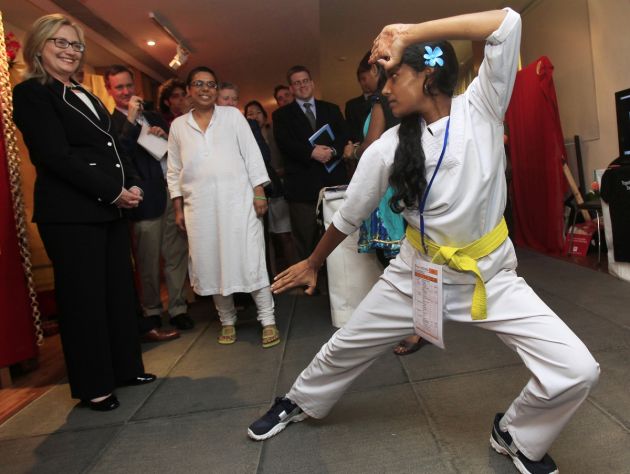Nuns take the lead with police on brothel raids in India

With the help of police, the Sisters of Mary Immaculate have put 30 human traffickers behind bars as they have raided brothels in India's West Bengal capital of Kolkata.
Shedding their habits for regular clothes the disguised nuns in groups of three or four accompany police as they raid brothels in Kolkata, India, at night in the city where Mother Teresa worked.
There they have removed young women and girls as young as 12 from their captors, Carol Glatz of the Catholic news agency ucanews reported.
In four years, "we have put 30 traffickers in jail," said Sister Sharmi D'Souza, a member of the Sisters of Mary Immaculate, told journalists at a Vatican news conference on December 10.
She and a number of other religious women attended the event that presented Pope Francis' World Day of Peace message, which urged everyone to fight modern forms of slavery.
"In one night, we saved 37 girls," she said, noting that 10 were minors. The sisters take the women to safety and offer them support and assistance; the women also provide critical information to police, such as names of traffickers and the location of other brothels.
Sisters on the front line of the fight against modern slavery were guest speakers in the Vatican press office.
They shared their personal experience of working with trafficked victims in Italy, India, Brazil, Nigeria and Costa Rica.
Sister Sharmi said if police refuse to go with the nuns on a raid because they have been bribed by traffickers, the nuns go to someone higher up on the chain of command, "and they take action."
"We never go alone. We go along with other NGOs together. But we need our pastors to come along with us, our bishops, our priests to support us, because if they are with us we can still do more," she said.
MORE PRIESTS NEEDED TO FIGHT TRAFFICKING
The call to get more priests and religious men active in the fight against trafficking was reiterated by a U.S. priest in the audience during the question-and-answer portion of the news conference, the Catholic News Service reported.
"The presence of such dedicated women religious is extraordinary. The absence of priests and male religious [at the news conference] is even more noticeable," said Father Jeffrey Bayhi, pastor of St. John the Baptist and Our Lady of the Assumption churches in Zachary, Louisiana.
He appeared to be the only priest in the audience who was not part of the Pontifical Council for Justice and Peace, which presented the Pope's message to the press. CNS reported.
February 8 is the feast of St. Josephine Bakhita and will be the first International Day of Prayer and Awareness Against Human Trafficking.
Bayhi said, however, "in the United States, very few people are going to know who she is, and very few priests will be able to tell them about her" or about the global problem of human slavery.
While women religious are on the streets helping victims, priests need to take advantage of "the pulpit" to speak out against the exploitation of other human beings.
"That's the one microphone we have got worldwide, that the priest in the church can help educate" others, he said.
Pastoral letters about trafficking "are great, but until it gets in the parish on the pulpit with the priest" where it might lead to a conversion of hearts and action, "I'm afraid very little will be done."
The real cause behind all the new forms of slavery and exploitation is "human life has been so devalued," Bayhi said.